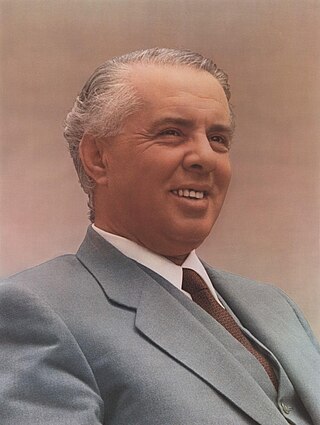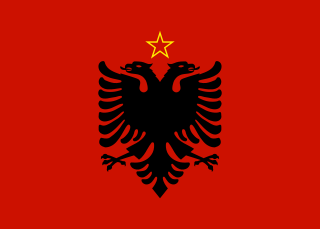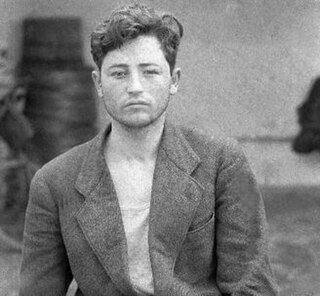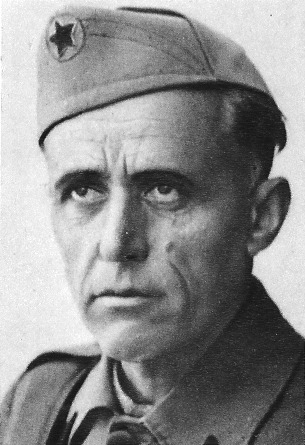
Enver Halil Hoxha was an Albanian communist revolutionary and politician who was the leader of Albania from 1944 until his death in 1985. He was the First Secretary of the Party of Labour of Albania from 1941 until his death, a member of its Politburo, chairman of the Democratic Front of Albania, and commander-in-chief of the Albanian People's Army. He was the twenty-second prime minister of Albania from 1944 to 1954 and at various times was both foreign minister and defence minister of the country.
The Enchele's polity was the earliest to emerge and centered in Albania. Also the earliest known Illyrian king, Bardylis, emerged in what is now Albania around 400 BC, aiming to make Illyria a regional power interfering with Macedon. He united many southern Illyrian tribes under his realm and defeated the Macedonians and Molossians several times, expanding his dominion over Upper Macedonia and Lynkestis. Before the Rise of Macedon Illyrians were the dominant power in the region. The kingdom of the Taulantii under Glaukias' rule was based in central Albania and dominated southern Illyrian affairs in the late 4th century BC, exerting great influence on the Epirote state through the close ties with the Molossian king Pyrrhus. Under the Ardiaei the greatest known Illyrian kingdom emerged in the 3rd century BC encompassing also northern Albania in its core territory. It became a formidable power both on land and sea by assembling a great army and fleet, and directly ruling over a large area made up of different Illyrian tribes and cities that stretched from the Neretva River in the north to the borders of Epirus in the south, while its influence extended throughout Epirus and down into Acarnania. The dominant power of the Illyrian kingdom in the region ceased after the Illyrian defeat in the Illyro-Roman Wars. The last known "King of the Illyrians" was Gentius, of the Labeatae tribe.

Tirana is the capital and largest city of Albania. It is located in the centre of the country, enclosed by mountains and hills, with Dajti rising to the east and a slight valley to the northwest overlooking the Adriatic Sea in the distance. It is among the wettest and sunniest cities in Europe, with 2,544 hours of sun per year.

In Albania, World War II began with its invasion by Italy in April 1939. Fascist Italy set up Albania as its protectorate or puppet state. The resistance was largely carried out by Communist groups against the Italian and then German occupation in Albania. At first independent, the Communist groups united in the beginning of 1942, which ultimately led to the successful liberation of the country in 1944.

The Party of Labour of Albania (PLA), also referred to as the Albanian Workers' Party (AWP), was the ruling and sole legal party of Albania during the communist period (1945–1991). It was founded on 8 November 1941 as the Communist Party of Albania but changed its name in 1948 following a recommendation by Joseph Stalin. The party was dissolved on 13 June 1991 and succeeded by the Socialist Party of Albania and the new Communist Party of Albania. For most of its existence, the party was dominated by its First Secretary, Enver Hoxha, who was also the de facto leader of Albania from 1944 until his death in 1985.

The People's Socialist Republic of Albania, officially as the People's Republic of Albania from 1946 until 1976, and as the Republic of Albania from 1991 to 1992, was the communist state in Albania from 1946 to 1991. It succeeded the Democratic Government of Albania (1944–1946).

The Italian invasion of Albania was a brief military campaign which was launched by the Kingdom of Italy against the Albanian Kingdom in 1939. The conflict was a result of the imperialistic policies of the Italian prime minister and dictator Benito Mussolini. Albania was rapidly overrun, its ruler King Zog I went into exile in neighboring Greece, and the country was made a part of the Italian Empire as a protectorate in personal union with the Italian Crown.

The National Liberation Movement, also translated as National Liberation Front, was an Albanian communist resistance organization that fought in World War II. It was created on 16 September 1942, in a conference held in Pezë, a village near Tirana, and was led by Enver Hoxha. Apart from the figures which had the majority in the General Council it also included known nationalists like Myslim Peza. In May 1944, the Albanian National Liberation Front was transformed into the government of Albania and its leaders became government members, and in August 1945, it was replaced by the Democratic Front.

Vasil Laçi, People's Hero of Albania, also referred to as Vasil Llaçi, was an Albanian patriot and anti-monarchist who attempted to kill Victor Emmanuel III, King of Italy and Shefqet Bej Vërlaci, Prime Minister of Albania after the occupation of Albania by fascist Italy.
Fadil Paçrami was an Albanian politician, writer and playwright. He served as Chairman of the Assembly of the Republic of Albania from 20 November 1970 to 25 September 1973. He used to be the minister of education and culture, as well as the speaker of the Albanian parliament. In 1975, he was wrongfully accused of anti-communist activity and got a 25-year sentence. He was freed from prison in 1990 by Ramiz Alia, Enver Hoxha's successor.

Safet Butka was an Albanian professor, politician and nationalist. Son of famous patriot Sali Butka, he organized the student demonstrations in April 1939 during the Italian invasion and was interned in Ventotene. Upon his return he organized antifascist movements in his native region and was one of the founders of the nationalist organization Balli Kombëtar. Distressed by internal civil war in Albania, he killed himself in 1943.

Abaz Kupi or Abas Kupi. He was also known as Bazi i Canës. He was an Albanian military officer.
Selman Riza (1909–1988) was an Albanian linguist and Albanologist. Riza was one of the founding members of the Albanological Institute of Pristina in 1953.

Misto Treska was an Albanian translator, diplomat (Ambassador), writer and politician of Albania during communist regime. He has translated French authors such as Hugo, Maupassant, Stendhal and Diderot into Albanian. He has served in the Albanian diplomacy, particularly in exchanges of cultural relations of Albania with foreign countries. He has notably been Ambassador in Paris. Treska was also one of the prosecutors of the military trial in which Axis collaborators Lef Nosi, Anton Harapi, Maliq Bushati were sentenced to death.

Vojo Kushi was an Albanian and Yugoslav communist guerilla fighter (partisan) and one of the founders of the Communist group based in Shkodër, following the Italian occupation of Albania in April 1939. He was proclaimed a National Hero of Yugoslavia by the Yugoslav communist government on February 12, 1945, and then a Hero of Albania by the Albanian communist government in 1946.

Myslym Peza was a distinguished World War II veteran who led the anti-fascist movement "Çeta e Pezës", the members of which founded the Communist Party of Albania.
Stefanaq Pollo was an Albanian academic, professor and historian during Communist Albania.
The Treaties of Tirana were signed in Tirana between Albania and Italy in the 1920s, bringing Albania into the Italian sphere of influence and gradually turning the Albanian state into a de facto protectorate of Italy.

Thoma Koço Xhixho was a major-general of the Albanian Army, military scientist, founder and first commander of the Albanian Military Academy. He is one of the framers of the Albanian Military Art, as well as the base documents and regulations for training in the Albanian Army. During World War II, Thoma Xhixho was one of the important leaders of the National Liberation Army (NLA). At the onset of the Antifascist Resistance in Albania, he was one of its first members and one of the first commanders of the armed resistance against occupation forces.















